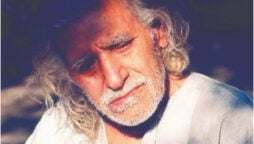
PTV cannot bring back its halcyon days by using foreign content as a crutch
When was the last time you watched PTV? Before Ertugrul Ghazi was aired on the state-run network in 2020, most viewers would have struggled to find a precise answer to this question. A dubbed version of the Turkish historical-fiction series Dirilis Ertugrul, the show has the rare distinction of being recommended to the nation by former premier Imran Khan – an unusual yet significant feat.
Once PTV obtained the rights to air the dubbed version, the series proved to be a roaring success. If statistics are anything to go by, Ertugrul Ghazi attracted 130 million viewers by May 2020. Owing to the popularity of the show, the subscribers of PTV’s YouTube channel increased by over five million in June 2020. The figure eventually crossed 10 million by September.
This has compelled media pundits to prematurely assume that PTV is witnessing a revival of sorts and has discovered the right recipe to draw the attention of audiences. Be that as it may, analysts are advised against jumping to such optimistic conclusions without understanding the issue in its entirety.
Even so, it would be wrong to fault anyone for making such assumptions. Since the early 2000s, Pakistan’s electronic media has found itself in the grips of the invisible hand. The liberalisation of TV channels has fuelled stiff competition to attract a wide viewership. With the influx of privately-owned channels, the country’s television systems have plunged neck-deep into addressing concerns about commercial viability. PTV, however, is a state-affiliated channel and operates on a disparate set of priorities that can’t just be understood through the blinkers of profitability. Conventional wisdom dictates that state-run television stations should entirely divest themselves of commercial logic. Active proponents of this philosophy believe that state-affiliated media must operate with the intention of preserving the public interest and remain committed to a development-oriented agenda.

That said, the gap between expectation and reality appears to be fairly vast. It is often difficult for state-funded channels across the world to strictly adhere to these standards. In the UK, the state-run BBC is exclusively funded by the television licence fee paid annually by viewers and doesn’t carry advertisements on its domestic channels. However, international channels run by the BBC do benefit from subscriptions and advertisements. In a similar vein, PTV also hasn’t rigidly complied with the state-run model. Since its inception, the network has been airing advertisements. The only difference is that PTV’s advertising revenue hasn’t always provided a viable means of sustaining the network and a licence fee had to be introduced to ensure financial survival. PTV must, therefore, engage in a balancing act to secure its commercial viability while catering to the public good.
While a commercially-driven approach has gained currency at private channels, audiences continue to harbour a nostalgic fascination for Pakistani dramas of yore that were aired on PTV. A vast majority of contemporary TV plays have been criticised for their regressive outlook. Sceptics believe that these dramas cannot measure up to the content produced in the glorious heydays of the state-run channel.
If this logic is to serve as a gauge, PTV has, in its bygone era, set a benchmark that audiences would like to see replicated on private channels. Unfortunately, the state-run network has done little to uphold the standards that it once actively pioneered. Under these circumstances, PTV must carry out the herculean task to reclaim the stature it once had in the 1970s and 1980s. This cannot be achieved if the network sees itself as a purveyor of foreign content.
In hindsight, the decision to purchase the rights of Ertugrul Ghazi made business sense in 2020. Months before the series was aired, newspaper reports suggested that the network was struggling to remain afloat and didn’t have a concrete business plan. As per a news report published in early 2020, PTV was seeking to transfer an additional burden of Rs20 billions to consumers by increasing the TV licence fee by Rs65. The move was mercifully deferred by the federal cabinet a few months later after various ministers raised objections.

After Ertugrul Ghazi was aired, many tweet wars have been fought about its effect on our society. Some believed that the series provided an intimate glimpse into Islamic culture and heritage, and acted as a counter to the unflattering portrayals of Muslims churned out by the Western media and Indian films. Sceptics felt that the decision to broadcast foreign content would have an adverse effect on our local entertainment industry. Many of them even went to the extent of arguing that PTV wasn’t the most appropriate channel to run Ertugrul Ghazi as a state-affiliated network must cater to the national interest.
Be it a decision that was taken under government pressure or to guarantee its financial survival, PTV now has to look beyond the Ertugrul craze. At this critical juncture, the state network needs to take creative risks and find inventive methods to revive its lost glory. In an era when private channels are producing formulaic TV plays that focus on marital discord and place women in stereotypical straitjackets, PTV should dare to be different. The channel must take a chance on scriptwriters who are prepared to paint on a different canvas instead of focusing on an oft-repeated, predictable formula. Only then can PTV establish a new benchmark in the realm of entertainment.
The state-affiliated network has to re-establish its reputation as a purveyor of original content. A concerted effort must be made to push the envelope and spotlight social issues that have hitherto been unexplored in local dramas. Audiences are constantly searching for new, refreshing content. If PTV can provide them such dramas, it is unlikely that they will opt for the cliché-riddled shows found in abundance on private channels.
In addition to taking risks with new concepts that may be either hits or misses, PTV should also stick to the information it already has about the preferences of its consumers. For instance, the success of Ertugrul Ghazi has revealed that there is a voracious appetite for historical or period dramas. The state network should contemplate the possibility of producing TV serials about historical figures who are valued in Pakistan.
PTV cannot bring back its halcyon days by using foreign content as a crutch. The channel can only increase its popularity through an emphasis on originality and a willingness to capitalise on local talent.
Catch all the Breaking News Event and Latest News Updates on The BOL News
Download The BOL News App to get the Daily News Update & Live News.












 Read the complete story text.
Read the complete story text. Listen to audio of the story.
Listen to audio of the story.